Daniel Morgan: Last chance for family in Britain's most-investigated, unsolved murder
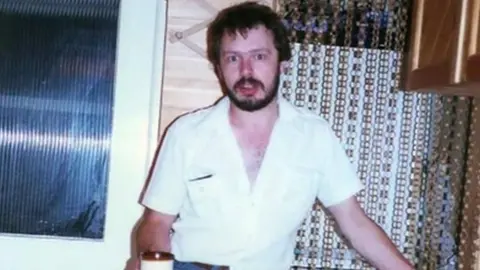 Family handout
Family handoutThe final report into the death of Daniel Morgan - Britain's most-investigated, unsolved murder - has been published. In 1987, the private investigator was found dead in the car park of the Golden Lion pub in south London, with an axe in his head. Despite five separate police inquiries, spanning more than two decades, no-one has been convicted of his murder.
The family believe police corruption, and reluctance to confront it, could explain the murder and the failed investigations.

The murder
10 March 1987
Private investigator Daniel Morgan, 37, and his business partner at Southern Investigations, Jonathan Rees, meet for a drink in the Golden Lion pub in Sydenham, south-east London. Both leave the pub about 21:00.
By 21:30, Rees meets another man, professional bodyguard Paul Goodridge, in the Beulah Spa pub, three miles away in Crystal Palace.
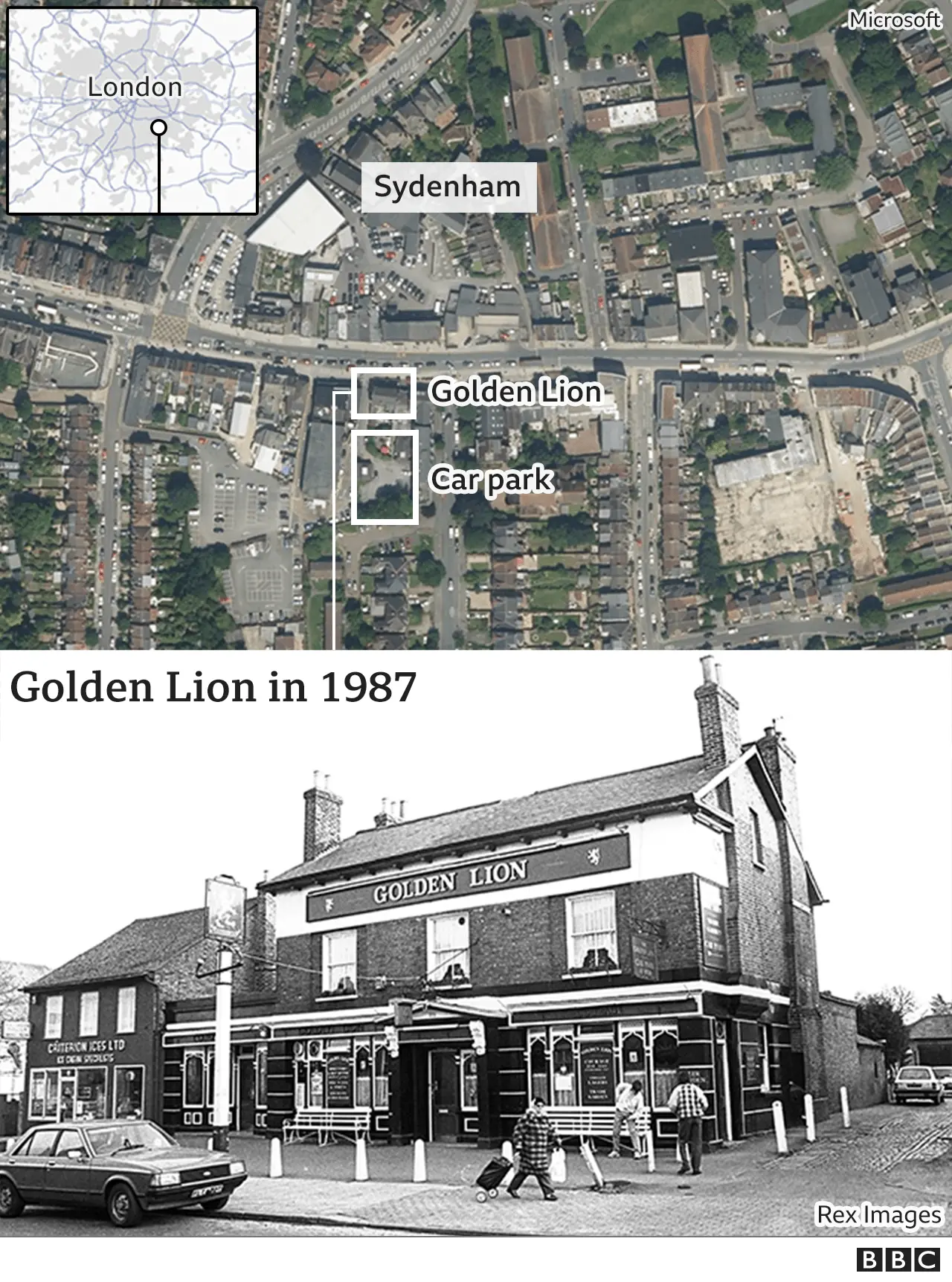
At 21:40, a BBC sound producer pulls into the car park of the Golden Lion and finds Daniel Morgan's body. He is lying face up with an axe embedded in his head.
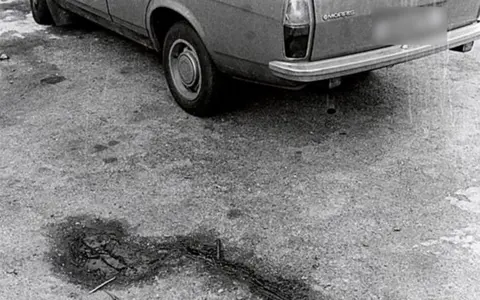 Jonathan Buckmaster
Jonathan Buckmaster
The first police investigation
Daniel's brother Alastair Morgan travels from his Hampshire home to London - to offer help, and observe the investigation.
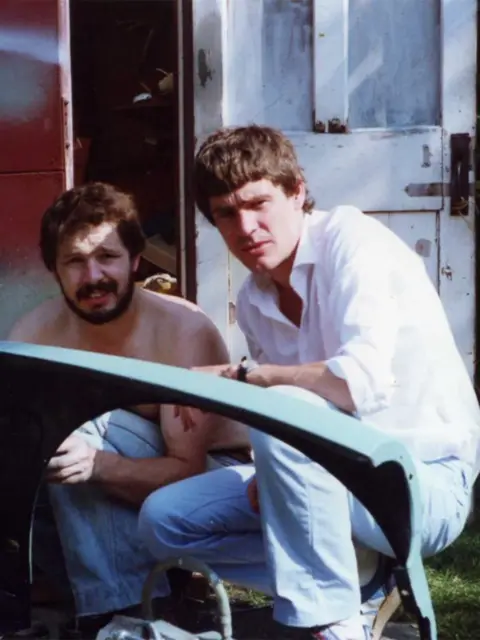 Family handout
Family handoutMarch 1987
Det Sgt Sid Fillery, who knows Rees and has moonlighted in the past for Southern Investigations, is initially assigned to the murder investigation. He is taken off the case after several days.
April 1987
Six people are arrested on suspicion of the murder of the private investigator from Cwmbran in south Wales - including Jonathan Rees, Sid Fillery and Rees's brothers-in-law Glenn and Garry Vian. All are later released without charge.
May 1987
Bryan Madagan, Daniel's former employer, tells police he believes Daniel was trying to sell a story about police corruption to a newspaper. Later, others tell the family similar accounts. The family begin to suspect this may have been part of the reason Daniel was killed.

The inquest
April 1988
Kevin Lennon, the accountant at Southern Investigations, tells the inquest that Morgan and Rees had fallen out. He believes Rees was "determined" to have Morgan killed with the help of his friends in the police.
Rees denies murder. Lennon's testimony is undermined when it emerges he has been convicted of tax fraud.
The inquest returns a verdict of unlawful killing, and the family begin raising the case with their local MPs.
 Getty Images
Getty Images1988
Fillery leaves the Metropolitan Police and starts to work for Southern Investigations with Rees.

The second police investigation
Hampshire Police are called in to look at the handling of the first murder inquiry, and allegations that Met Police officers could have been involved in Daniel Morgan's death.
July 1988
Under the supervision of the Police Complaints Authority, Hampshire Police are appointed to investigate allegations that police were involved in Morgan's murder.
February 1989
Three arrests are made, and Rees and bodyguard Goodridge are charged with murder.
Jean Wisden, Goodridge's girlfriend, is charged with perverting the course of justice.
In May, all charges are dropped.
March 1990
The Police Complaints Authority reports the findings of the Hampshire inquiry into the Met Police.
"No evidence of involvement by any police officer in the murder," is the conclusion, with "no evidence to support [Kevin] Lennon's allegations," made at the 1988 inquest.
Hampshire Police also find "no evidence to suggest any member of the murder investigation team took deliberate action to prevent the murder being properly detected".
There are "no grounds for disciplinary action against any officer [found moonlighting for Southern Investigations] other than strict admonishment".
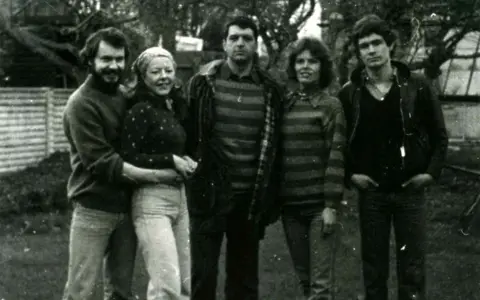 Britt-Marie Pettersson
Britt-Marie Pettersson1990
Rees and Fillery start working regularly for tabloid newspapers, including the News of the World.

The third police investigation
In November 1997, Alastair Morgan and his local MP, the then culture secretary Chris Smith, are assured by senior Met officers, including Commissioner Sir Paul Condon, that Daniel's case will be reviewed.
What happens next will lead to convictions, but not for murder.
Met teams gather evidence - some of it covertly by bugging the south London office of Southern Investigations.
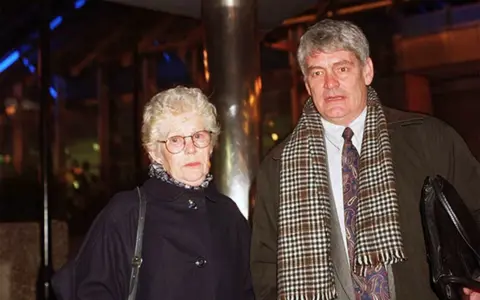 PA Media
PA MediaApril 1999
A police bug picks up a conversation between Rees and a client. The men discuss planting drugs on the client's wife so he would get custody of their son.
Nearly six months later, several people - including Rees - are charged with conspiracy to supply Class A and B drugs, and conspiracy to pervert the course of justice.
Four people are later convicted, including Rees, who is sentenced to seven years.

The fourth police investigation
The Morgan family keep up the pressure on the Met, and a new investigation - Operation Abelard - begins in the summer of 2001.
Police buy the house next door to suspect Glenn Vian, so they can conduct surveillance.
June 2002
A reward of £50,000 is offered for information leading to the killer - and a reconstruction of the murder is featured on the BBC's Crimewatch.
Det Ch Supt David Cook fronts the appeal. He will later become the case's senior investigating officer (SIO).
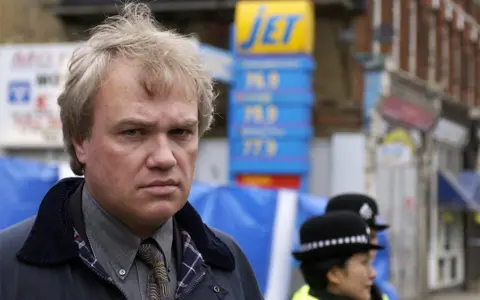 PA Media
PA MediaHe and his wife, police officer and Crimewatch presenter Jacqui Hames, are put under surveillance by the News of the World. Jacqui Hames later gave evidence to the Leveson inquiry - the public inquiry into the practices of the British press following the phone hacking scandal. She said there was "in some way some collusion between people at the News of the World, and people who are suspected of committing the murder of Daniel Morgan".

October 2002
James Cook and the Vian brothers are arrested on suspicion of murder. In December, Rees is questioned in prison.
September 2003
The Crown Prosecution Service (CPS) says there is insufficient evidence for a murder prosecution.
October 2004
Frustrated yet again, the Morgan family secure a meeting with the minister responsible for policing, Hazel Blears, to call for a public inquiry into Daniel's case. Their request is refused.
October 2005
Daniel's murder is discussed by the Metropolitan Police Authority (MPA) - the body at that time responsible for scrutinising the work of the Met.
It tells the Met Commissioner Ian Blair to produce a new report on the case. He admits the first murder inquiry in 1987 was "compromised".
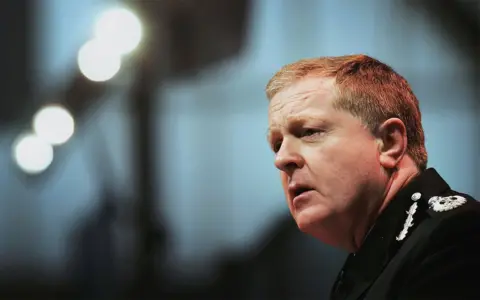 Getty Images
Getty ImagesJanuary 2006
Assistant Commissioner John Yates writes in a report that the investigation had unearthed some new evidence and information:
"This was presented to Treasury Counsel for review. His conclusion was that he was satisfied that we now know the identity of those responsible for Daniel Morgan's murder but that the evidence available did not meet the threshold to enable a prosecution to be commenced."

The fifth police investigation
Nearly 20 years after Daniel Morgan was killed, a new police investigation begins. It would nearly lead to a full criminal trial.
March 2006
Police work with three supergrass witnesses - criminals who are giving information. The process is complex and requires an independent team to handle these witnesses.
November 2006
Daniel Morgan's murder features on Crimewatch again.
April 2008
Four suspects are charged with murder - Rees, Glenn and Garry Vian, and another man, James Cook.
Sid Fillery is charged with attempting to pervert the course of justice.
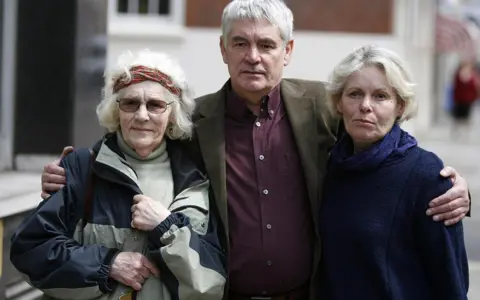 PA Media
PA MediaFebruary 2009
Met deputy assistant commissioner John Yates tells then Mayor of London Boris Johnson that Daniel Morgan's case "is one of the most deplorable episodes in the entire history of the Metropolitan Police Service. This family has been treated disgracefully."
September 2009
Legal arguments for the trial of the suspects begin at the Old Bailey.
March 2011
The case collapses before the start of the trial, and all four men are acquitted.
The judge rules the three supergrasses cannot stand as witnesses.
Acting Met commissioner Timothy Godwin acknowledges "the repeated failure of the MPS [Metropolitan Police Service] over the years to confront the role played by police corruption in protecting those responsible for the murder from being brought to justice".
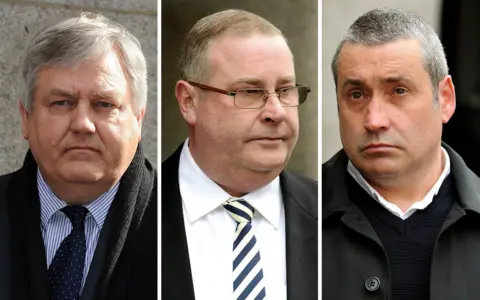 PA Media
PA Media
After the investigations
August 2011
The Morgan family meet Home Secretary Theresa May to ask for a public judicial inquiry.
May 2013
The Daniel Morgan Independent Panel (DMIP) is formally announced - with Baroness Nuala O'Loan appointed chair the following year.
Its remit is to "shine a light on the circumstances of Daniel Morgan's murder, its background and the handling of the case over the period since 1987".
February 2017
First judgment is made in a claim for malicious prosecution and misfeasance in public office - brought by Fillery, Rees and the Vian brothers against the commissioner of the Met.
Fillery wins damages. The other claims are initially dismissed.
July 2018
Rees and the Vian brothers win their claim on appeal.
July 2019
Rees and the Vian brothers are awarded total of £414,000 in damages. The judge awards the sum to "highlight and condemn the egregious and shameful behaviour of a senior and experienced police officer" - referring to Det Ch Supt David Cook, who oversaw the investigation.
The evidence of a man called Gary Eaton had been excluded from the potential trial because the officer was found to have compromised Eaton's interview.
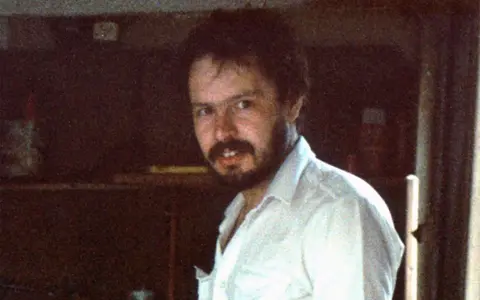 PA Media
PA MediaSince the collapse of the case, Det Ch Supt David Cook has been repeatedly investigated over his conduct in the investigation, although the CPS has found insufficient evidence to prosecute. Because of this, he was unable to give evidence to the panel before 2020.
The panel completed its report this spring, and was expecting to send it to the Home Office on 14 May, with its publication in Parliament the following Monday. After an initial delay, Home Secretary Priti Patel told the panel she needed more time to assess the report for national security, and to ensure it was in alignment with the Human Rights Act. On 8 June, the Home Office said the report would be published to Parliament on 15 June, and nothing would be blanked out.
